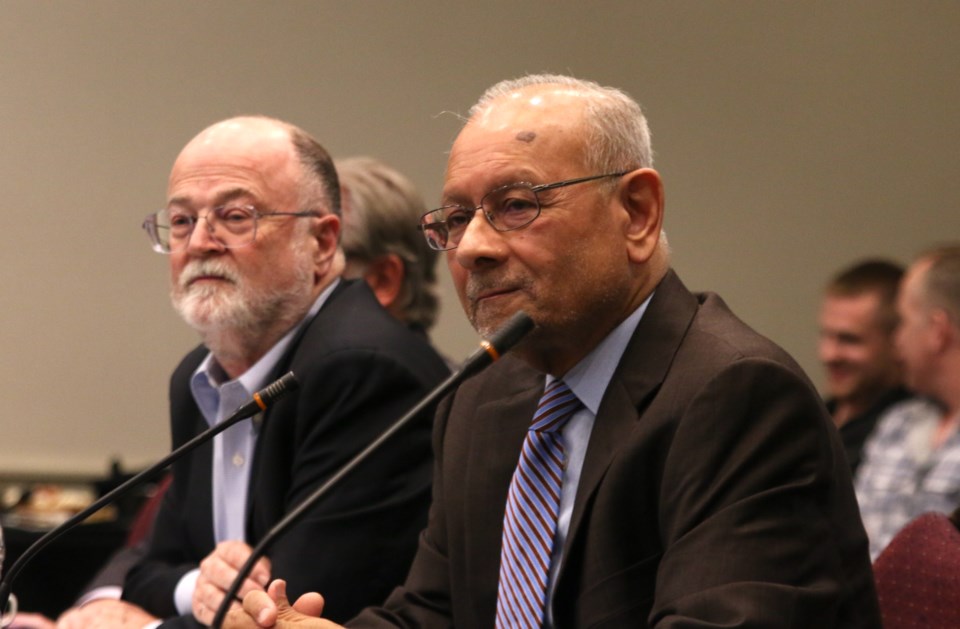THUNDER BAY — Members of the Thunder Bay Police Services Board say the latest report examining serious issues within the police service and the board itself will provide a path forward in creating real change, but it will require a lot of work and commitment.
“I’m feeling positive. I know there is going to be a lot of work, but I thought it was concise, a pathway,” said Thunder Bay Police Services Board member Karen Machado. “There is a lot to do there. It’s not something that is going to happen overnight. But we are finally getting somewhere where we are going to make some change. We are committed.”
A report prepared by an expert panel was presented to the police services board during a special meeting on Thursday.
The expert panel was convened by the Police Services Board in March 2022 and it held numerous consultations throughout the year with community organizations, police service members, and public meetings.
Panel chair Alok Mukherjee provided an overview of the report to the board and the 10 action proposals for moving forward.
“We came to the conclusion that Thunder Bay needs organizational transformation, both in terms of governance and the delivery of services,” Mukherjee said. “We came to the conclusion in terms of our mandate, to be able to deal with issues of human rights, mental health, relationships with Indigenous culture, there needs to be a wholesale organizational change.”
The action proposals relate to human rights, anti-racism, inclusion, community partnerships, trauma-informed approaches to policing, developing a regional, collaborative model of policing, labour relations, police leadership, independent monitoring and accountability, and forensic pathology services.
The report did not set any priorities for the action proposals, but Mukherjee said there is a sense of urgency throughout.
“We refrain from setting artificial timelines,” he said. “We have, however, said that the very first proposal is that the governance committee of the board, which has been in place since last October, develop a timeline and develop a public reporting mechanism on progress.”
Malcolm Mercer, the Ontario Civilian Police Commission appointed administrator of the police services board, said the board will need to spend time reflecting, considering, and taking advice of the panel and determine what to do and in what order.
“This is serious work. It is a report focused on the history and current reality of northwestern Ontario and Thunder Bay,” he said. “In order to be able to move forward, in order to affect change, in order to overcome a history with which one is not satisfied, one must be optimistic, that there is the possibility of change.”
These sentiments were echoed by members of the board, including Thunder Bay mayor Ken Boshcoff, who said while the community may find the findings painful and hurtful to hear, it is part of the path moving forward.
“The only way we can overcome any of these things is to accept the reality and by sincerity and only then can we realize the potential of our community and to ensure our aspirations to be a safe and welcoming community can actually be realized,” he said.
“We didn’t create this problem overnight,” added police services board member Shelby Ch’ng. “This has been inherited through a whole system of colonialism and oppression and I think it’s going to take a lot to unpack and figure out what is going to be the way forward for us.”
During the meeting, Ch’ng asked if any of the action proposals had been costed, but Mukherjee said there are risks for the panel when it comes to providing costs.
“The costs have to be assessed in terms of what capacity exists, how realistically you can move forward, what needs to be done, and the opening of other opportunities,” he said.
Boshcoff reiterated that the report is hard-hitting for the community but he believes the majority of people in the city are good. He asked Mukherjee if the panel could provide any comparisons between the situation in Thunder Bay and other cities across Canada.
“Is it unique, of course not,” Mukherjee said. “There are similar challenges in other communities across the country. We were not engaging in any kind of comparison to say this is the worst we have seen. What has happened here is there has been a sustained expectation of change.”
Nishnawbe Aski Nation Deputy Grand Chief Anna Betty Achneepineskum, who has previously called for the Thunder Bay Police Service to be disbanded, said the path forward for the service must also involve remorse and acceptance of responsibility.
In a statement issued on Thursday, Achneepineskum said the expert panel’s report shows the Police Service’s leadership “continues to refuse to accept responsibility for its failures and shows no signs of changing.”
“Inadequate investigations, mishandling of cases, and failure to address urgent issues are not a result of being under-funded, they are a result of failure of leadership,” she said.
“More than 550 recommendations have been made since 1993 to correct the glaring faults of this Service. Very little work has been done to implement them, and those in authority must be held accountable.”
Achneepineskum added that the report demonstrates to the leadership of the police service that the status quo is no longer acceptable.
“Ignoring the need to take responsibility and continuing to pass blame onto other entities, like the provincial and federal governments, will not bring progress. I agree that funding is an underlying issue, but it is not the cause of all of the challenges this Service is facing,” she said.
“Without leadership accepting responsibility, it is impossible to expect that serious issues such as systemic racism can even begin to be addressed.”
